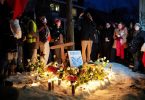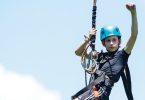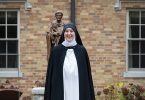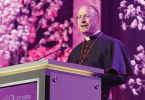
by Olivia Martin
olivia.martin@theleaven.org
PACORA, Panama — Eduardo entered the small library of Las Garzas de Pacora juvenile detention center for an interview with World Youth Day (WYD) press with sweat on his forehead, his shirt covered in paint and a small smile.
He and dozens of others had been touching up the outside of the school building in preparation for Pope Francis’ visit on Jan. 25.
But Eduardo hasn’t just been preparing the buildings to receive the pope — he’s been preparing his soul.
The 21-year-old will be the first of 12 young men in Pacora to have his confession heard by Pope Francis.
“I want to give him an overview of my life,” he said, “at least, a really fast one.
“I’m going to tell him everything, and I know I’m going to get rid of all of this weight inside me.”
Born into a devoutly Catholic family, Eduardo became involved in gang activity at a young age. He was designated as his gang’s hitman and eventually was arrested for homicide.
“I don’t know how I became involved in the gangs,” said Eduardo, “but I never stopped going to Mass. God never abandoned me.”
Eduardo was transferred to Pacora from a prison in the Chiriquí region of Panama due to bad behavior and was not permitted to bring anything with him.
But in November, when the center conducted a surprise inspection, they found Eduardo wearing a purple plastic rosary under his shirt that he refused to take off.
“I wouldn’t take it off,” he said, pulling the rosary out from underneath his shirt. “I always wear it.”
So, Emma Alba, the international director of the Institute of Interdisciplinary Studies, let him keep the rosary.
Starting his sentence as a maximum- security prisoner, Eduardo has responded well to Pacora’s rehabilitation and is now entrusted with minimum security.
Eduardo points to July 16, 2018, as a turning point for the good in his rehabilitation.
That was the day the gangs murdered his brother.
“Since they killed my brother, I’ve been a different person,” said Eduardo. “That pain that I felt is the same that the families of the people I killed felt.”
Alba and Sharito Vargas, Alba’s assistant, hope that Eduardo’s encounter with the pope will be the impetus of a penetrating change that will stand the test of time.
“Up to this point, he says he is trying to change,” said Vargas. “Sometimes, the boys say they’ve changed, but it’s an apparent change, not a real one.”
“[But] with this experience that he’s going to have with the pope,” continued Vargas, “I think that will start a true, deep change within him. That is our hope.”
And for Eduardo, he feels this promise of change is more than hope — it’s a guarantee.
“I know that this experience with the pope will be a 360-degree turn [for me],” he said.
“[Because of this,] I’m now making long-term goals,” he added.
A place to begin again
The Pacora juvenile detention center (El Centro de Cumplimiento de Menores de Las Garzas de Pacora) sits northeast of Panama City and is one of six facilities of its kind in Panama.
Currently housing 144 young men from 15 to 25 years of age, Pacora is not your average correctional facility; it employs a system of recuperation called Integral Intervention.
According to this model, the young men are freer than a traditional prisoner would be to move around its gated, heavily guarded campus — and they do everything from repairing the plumbing to cooking the meals.
Integral Intervention educates the men in mental health and communication. It also teaches them how to be a good son and a responsible father, as more than 30 percent of the men in Pacora have at least one child.
Additionally, the men learn skills that boost their employability, including artisanal baking, upholstery, painting, construction, carpentry, etc.
For example, 19-year-old Jorge and three other young men used skills learned in carpentry class to make a wooden crosier to present to Pope Francis as a gift.
“When I was told that I was going to participate [in making the crosier],” said Jorge, “I thought, ‘This has to look nice.’”
Made of wood from the Cocobolo tree, the crosier will serve as a reminder of Panama and the men at Pacora.
The top of the crosier, made by craftsman Ulbaldino Batista from the Herrera province, features carvings of the WYD Panama 2019 logo on one side and a chain broken by the cross on the other, symbolizing the freedom that comes with a relationship with Christ.
“It’s a privilege to have the pope here,” said Jorge. “The pope’s visit has brought union among us because lots of times each person minds his own business and no one is interested in anyone else.
“But with the pope coming, we have to be together. We’ve learned songs, how to be in harmony, and they’ve taught us how to communicate with God.”
Alba added that, while Pacora excels in educating and preparing the men for a better life, its weakness is spiritual preparation.
Until now.
“There has been an absence of the church here,” said Alba, “but we hope with the pope’s visit that’s going to change.”
In Pacora, the majority of the men are evangelical Christians, and priests visit sporadically, usually on Thursdays.
“So much has happened here in preparation for WYD,” said Alba. “The men have been attending regular catechesis, learning songs and asking questions about the faith.
“We hope the work of the Catholic Church doesn’t stop here.”
Where talent can grow
Pacora also provides each of its men with a formal education, including the opportunity to take university classes online.
“We have some kids who get killed when they leave,” said Vargas.
“But we also have stories that are uplifting, like . . . we have a kid who is studying to be an aviation pilot,” he added.
Some have even gone on to graduate from university.
“They discover in the prison all their talents,” said Vargas, “because everyone has talents.
“But we don’t always know what our talents are.”






